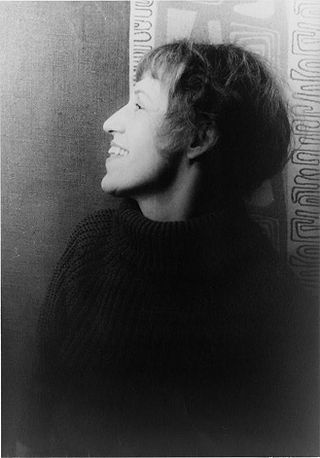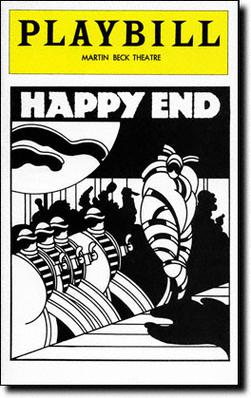
The Threepenny Opera is a 1928 German "play with music" by Bertolt Brecht, adapted from a translation by Elisabeth Hauptmann of John Gay's 18th-century English ballad opera, The Beggar's Opera, and four ballads by François Villon, with music by Kurt Weill. Although there is debate as to how much, if any, contribution Hauptmann might have made to the text, Brecht is usually listed as sole author.

Kurt Julian Weill was a German-born American composer active from the 1920s in his native country, and in his later years in the United States. He was a leading composer for the stage who was best known for his fruitful collaborations with Bertolt Brecht. With Brecht, he developed productions such as his best-known work, The Threepenny Opera, which included the ballad "Mack the Knife". Weill held the ideal of writing music that served a socially useful purpose, Gebrauchsmusik. He also wrote several works for the concert hall and a number of works on Jewish themes. He became a United States citizen in 1943.
"Mack the Knife" or "The Ballad of Mack the Knife" is a song composed by Kurt Weill with lyrics by Bertolt Brecht for their 1928 music drama The Threepenny Opera. The song tells of a knife-wielding criminal of the London underworld named Macheath, the "Mack the Knife" of the title.

Beatrice "Bebe" Jane Neuwirth is an American actress, singer, and dancer. Known for her roles on stage and screen, she has received two Emmy Awards, two Tony Awards, and two Drama Desk Awards.

Lotte Lenya was an Austrian-American singer, diseuse, and actress, long based in the United States. In the German-speaking and classical music world, she is best remembered for her performances of the songs of her first husband, Kurt Weill. In English-language cinema, she was nominated for an Academy Award for her role as a jaded aristocrat in The Roman Spring of Mrs. Stone (1961). She also played the murderous and sadistic Rosa Klebb in the James Bond movie From Russia with Love (1963).

Harold Smith Prince, commonly known as Hal Prince, was an American theatre director and producer known for his work in musical theatre.
Lost in the Stars is a musical with book and lyrics by Maxwell Anderson and music by Kurt Weill, based on the novel Cry, the Beloved Country (1948) by Alan Paton. The musical premiered on Broadway in 1949; it was the composer's last work for the stage before he died the following year.

Songs for a New World is a work of musical theatre written and composed by Jason Robert Brown. This was Jason Robert Brown's first produced show, originally produced Off-Broadway at the WPA Theatre in 1995. Brown and director Daisy Prince put together songs he had written for other venues and events, resulting in "neither musical play nor revue, it is closer to a theatrical song cycle, a very theatrical song cycle."
Love Life is a musical written by Kurt Weill (music) and Alan Jay Lerner.

Johnny Johnson is a musical with a book and lyrics by Paul Green and music by Kurt Weill. It premiered in 1936 on Broadway.

Lady in the Dark is a musical with music by Kurt Weill, lyrics by Ira Gershwin and book and direction by Moss Hart. It was produced by Sam Harris. The protagonist, Liza Elliott, is the unhappy editor of a fashion magazine who is undergoing psychoanalysis. The musical ran on Broadway in 1941, and in the United Kingdom in 1981. A film version was released in 1944, and a live television special followed in 1954.
Warren Coleman was an American operatic baritone. He created the roles of Crown in George Gershwin's Porgy and Bess and the role of John Kumalo in Kurt Weill's Lost in the Stars, in the premieres of each show on Broadway.

Ute Gertrud Lemper is a German singer and actress. Her roles in musicals include playing Sally Bowles in the original Paris production of Cabaret, for which she won the 1987 Molière Award for Best Newcomer, and Velma Kelly in the revival of Chicago in both London and New York, which won her the 1998 Olivier Award for Best Actress in a Musical.

Happy End is a three-act musical comedy by Kurt Weill, Elisabeth Hauptmann, and Bertolt Brecht which first opened in Berlin at the Theater am Schiffbauerdamm on September 2, 1929. It closed after seven performances. In 1977 it premiered on Broadway, where it ran for 75 performances.
Will Holt was an American singer, songwriter, librettist and lyricist. He was known first and primarily as a folk performer during the 1950s, when he made early and influential recordings of such songs as "Sinner Man" and "Lemon Tree", for which he wrote the English lyrics. He later became known as an interpreter of the music of Kurt Weill and Bertolt Brecht, and made significant contributions to Broadway theatre during the 1970s.

LoveMusik is a musical written by Alfred Uhry, using a selection of music by Kurt Weill. The story explores the romance and lives of Kurt Weill and Lotte Lenya, based on Speak Low : The Letters of Kurt Weill and Lotte Lenya, edited and translated by Lys Symonette and Kim H. Kowalke. Harold Prince had read Speak Low and suggested the idea for a musical to Uhry. Uhry and Prince worked on LoveMusik for four years to develop it into a stage work. The story spans over 25 years, from the first meeting of Lenya and Weill as struggling young artists, to their popularity in Europe and America, to Weill's death from a heart attack at age 50.
Martha Schlamme was an Austrian-born American singer and actress.

20th Century Blues is a live 1996 album by English singer Marianne Faithfull, in collaboration with pianist Paul Trueblood.
Leonard Jackson was an American stage, film, and television actor. He had roles in several PBS television series for children, including Shining Time Station and Sesame Street, and also acted in several films, including The Brother from Another Planet, Car Wash, and The Color Purple.

Berlin to Broadway with Kurt Weill is a musical revue with a book by Gene Lerner, music by Kurt Weill, and lyrics by various songwriting partners Weill worked with over his career. The plot follows Weill's life as he begins his career in Germany writing the music for controversial musicals, through his journey fleeing Nazi persecution, immigrating to the United States, and becoming successful on Broadway. Songs featured include those Weill collaborated on with Maxwell Anderson, Marc Blitzstein, Bertolt Brecht, Jacques Deval, Michael Feingold, Ira Gershwin, Paul Green, Langston Hughes, Alan Jay Lerner, Ogden Nash, George Tabori and Arnold Weinstein.













